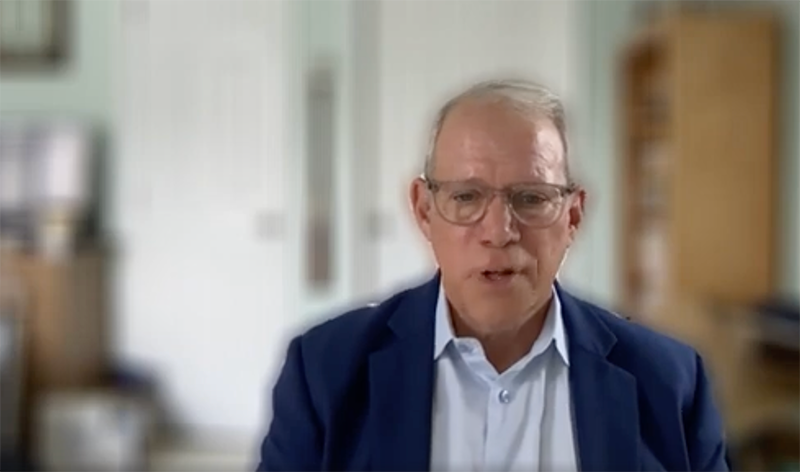This video examines how fiduciary duty underpins the legal and ethical foundation of board governance.
From legal obligations to leading practices, AGB General Counsel and Senior Fellow Tom Hyatt highlights why every trustee’s work must begin with this core responsibility.
Click to Read the Video Transcript
Whenever we talk about board governance, we’re talking about fiduciary duty. The question is why is fiduciary duty important? Well, it really is the foundation of all the work we do in terms of board governance.
First of all, it’s the law. Every state in the country imposes a set of rules that apply to directors and officers of a corporation to ensure that they’re acting in the best interest of the corporation and its constituencies.
So it really comes out of a legal obligation that applies to anyone who’s been elected or appointed to role as a director and officer.
Once you start with that as the foundation, all of our good governance practices, all the things we talk about at AGB in terms of leading practices, effective ways to perform, principles of trusteeship really are built on that foundation of fiduciary duty.
Legally, the duty of care is the duty to act in good faith and with that degree of care or skill or diligence that an ordinarily prudent person would exercise under the same circumstances.
That sounds pretty straightforward, right? So what does that mean in the real world? Well, an easy way to think about it is it’s the duty to read up, show up, and speak up.
First to read the materials. Staff works very hard putting materials together for a board. I serve on a board as well, a university board, and certainly know that that amount of material can be overwhelming sometimes.
Sometimes you don’t always get it as quickly as you’d like to be ready for the meeting, but nevertheless, that is your job, is to read those materials and be prepared for a good conversation.
Secondly, it’s the duty to show up. One of the things we can always tell is a problem with a board and being an effective board is we have a problem having a quorum for board meetings or committee meetings.
It suggests people are not engaged. In order for a board to take legally binding action, there has to be a quorum so that you can pass something that is before the board. So if you don’t show up and be a part of that, you can’t do anything legally, but you’re also not making the most of your talent, your acumen, your ability to work with other directors as you participate in board work.
And then finally, it’s the duty to speak up. It’s the duty to raise your hand, ask those questions, whether you’re the newest of directors at your very first meeting, or you’ve been doing this for nine or 10 years, put your hand up when you have a question.
If you have a question, it’s probably something that others are thinking about as well.
It can be tough in these zoom calls sometimes to break in, particularly in large boards. That’s why sometimes, an executive session, having that opportunity to
speak up is an additional window of time, if you will, to be involved in that.
But make sure that you get your question on the table so that we can have a robust conversation about that. It’s also about supporting the president and the CEO to ensure that you work collaboratively with that leadership team. The board is a strategic actor, the leadership team and the president is an executive actor, strategists and executives, how do we best work together to accomplish these things?
It is about thinking and acting strategically, as I said. Board members are not tasked with management of the organization. It’s a broader overview of the organization.
Ask those hard questions, set the strategic plan, but at the end of the day, executing on that belongs to the leadership team. It is being prepared to act.
The duty of care says we need to know that difficult things are coming our way, and we’re not simply reacting to them. We’re prepared to act. An easy example of that is cyber attacks, has happened or will happen at every college and university in the country.
It is a real-time threat.
If you’re not ready for it until it happens and now you’re scrambling to try to pull everything back together again, you’re gonna have a much harder time than if you have your resources, you know the drill, the protocol, what you’re going to do.
Is there a ransomware attack? Do you have to pay Bitcoin to somebody?
All of those things are things you’ve thought about before because you’re prepared to act on them as a board. The duty of care is about assessing options. It’s not waiting until you don’t have any time to make any other decisions, you don’t have any other choices, you got one decision left.
It’s about being prepared to think about what your options are from the best option to the worst option, and seeing how you’re gonna go forward with that.
And finally, a key element of the duty of care is courage. When you’re a fiduciary, that is someone who has that special responsibility with regard to overseeing the assets that are entrusted to their care, you have the duty to make those difficult decisions. You have the duty to show up and ask the hard questions and stand for the positions that you made and that the board has made.
But more than ever in higher education, courage is a key element of the duty of care.
So with regard to the duty of care, one of the elements of that certainly is courage. You have to be prepared as a trustee or an officer of a college or university to show courage in making incredibly difficult decisions that come your way, that because of your unique fiduciary responsibility, it’s on you to make those decisions.
What can be more difficult or require more courage than owning up to financial challenges that a college or university faces in making a decision to eliminate a major or program, to end the employment of tenured faculty members, to shut down perhaps a college or even the university itself, as will happen from time to time?
Those are decisions that aren’t made better by kicking that can down the road. It’s having the courage to make those difficult decisions and owning that in your unique role as a fiduciary, that is so key to being effective in showing that you’ve held up your duty of care.
Another essential fiduciary duty is the duty of loyalty. It is, again, a legal responsibility first.
It is the responsibility to act in good faith and to always put the interest of the organization you serve ahead of your personal or private interest.
The duty of loyalty is about ensuring that when you’re a trustee or an officer of an organization, that you are also being clear about your particular connection to matters that are before the board.
Now, whether it be a financial interest in a transaction before the board, whether it be a duality of interest, whether you serve on a board of another institution that may be consistent and complementary to your board, or it may have different policy modes, you may be going after the same donor dollars.
There may be ways in which you compete, where you have to ensure that you’re wearing that particular fiduciary hat of the board in which you serve and being true to its interest. The duty of loyalty is most often manifested in a conflict of interest policy.
All boards will have a conflict of interest policy. Again, the law requires this as well, but you’ll have a discreet policy that is more granular about your obligation to disclose your interest, to recuse yourself from voting on that transaction, and then for the board to determine whether that transaction can go forward or whether to back off from that.
An element to that also is an element of integrity. Integrity means that you’re going to disclose that interest, that you take on that affirmative obligation yourself. You’ll typically do it through a disclosure form, that’s a part of the conflict of interest process, but it’s a real-time obligation at any board meeting if the board doesn’t know that you have that interest to act with integrity and put that before the board as well.
So the duty of obedience is the third fiduciary duty, is the duty to be obedient to your mission, your purposes, your values, and obedient to the law. Obviously, there couldn’t be anything more important than being true to your mission, your purposes, your vision, your values. I recall having a conversation with an association director at one point and they said, “We don’t make a decision around here, including our board and our staff, that we don’t run through the prism of mission, vision, and values.”
Is this action consistent with our mission? Is it going to further our purposes? That obedience is really essential and really are your north stars. Anytime you’re trying to decide which way should we go here, this is a difficult decision for us to make, come back to that prism of values, purposes, mission, and that will help you make the right decision.
It’s also about being obedient to the law, ensuring that you have appropriate resources for compliance, more challenging than ever in the current regulatory and legislative environment in higher education, whether it’s in a compliance officer or that you devoted sufficient time in a board meeting to talking about particular issues. That duty of obedience is essential as well.
Mission, vision, and values are the key element of the duty of obedience. That’s what you’re being obedient to. It is the north star of the organization, in any decision that a board makes in determining whether it’s the right way to go forward, is this consistent with our purposes, with our mission, our vision, or values? The board owns those things. The board ultimately makes the determination about what those things look like.
So the duty of obedience is always going to be to ensure that you’re consistent with those things. It is something that lives not just on a sheet of paper that you might have in a binder somewhere, but it lives up here. It lives down here. It’s a part of your interactions with your board, with your community, with all of those whom you serve.
Higher education needs us more than ever right now, and there is no room for absentee trustees. We need to show up and be a part of those conversations, to do that difficult work.
It is challenging. It is sometimes a huge time responsibility to be on a college or university board or a foundation board, but nevertheless, being an active participant in that, asking those hard questions, making those courageous decisions is about showing up, so start there.




